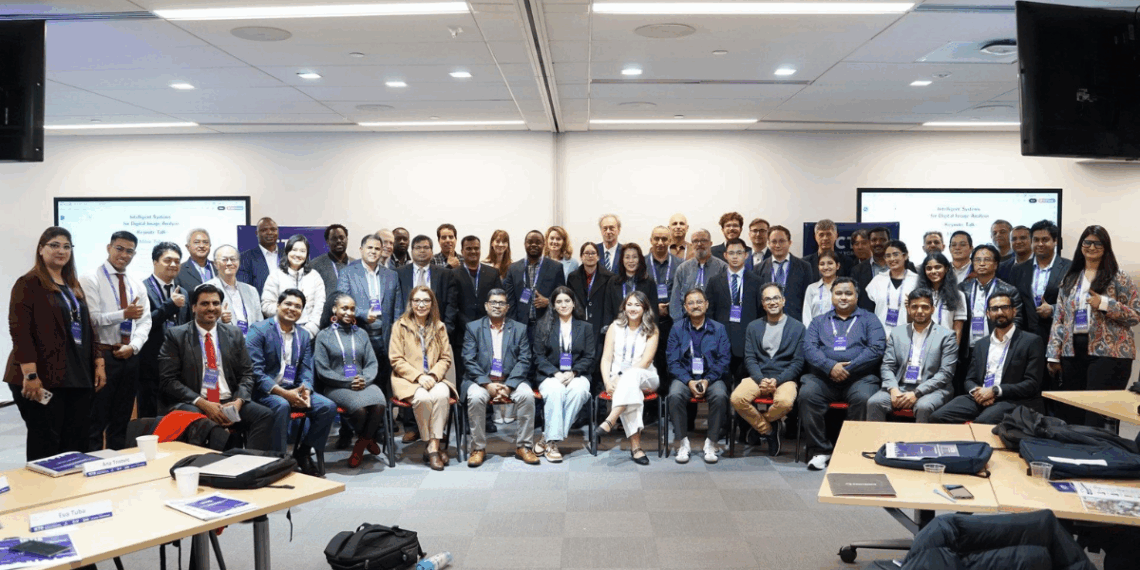Written by Jake Smiths
New York – On 23rd & 24th of May, 2025, Cornell University’s Conference Center in New York City played host to the second phase of the prestigious 10th International Conference on Information and Communication Technology for Intelligent Systems (ICTIS 2025). Organized by the Global Knowledge Research Foundation, this globally recognized event convened hundreds of distinguished scholars, industry experts, and technologists from around the world to discuss recent innovations, advances, and applications of intelligent systems in academia and industry.
ICTIS, now in its tenth year, is renowned for presenting cutting-edge technologies and solutions that address critical challenges across numerous sectors, including education, healthcare, transportation, and communication. The conference also provides a unique platform for the academic and professional communities to exchange ideas, forge collaborative partnerships, and discuss practical applications of emerging technologies.
A Convergence of Academic Excellence
Over three dynamic days, ICTIS 2025 featured keynotes, panel discussions, workshops, and research paper presentations, collectively highlighting the growing impact of advanced computational technologies on scholarly practice and academic integrity. This year’s sessions underscored the conference’s commitment to integrating innovative technologies into educational and research processes, with particular attention given to ethical implications, data accuracy, and system reliability.
One paper presentation that captured significant attention was “Unravelling Citation Resolution: A Comparative Study of Machine Learning Models for Natural Language Processing in Academic Journals,” authored and presented by Sunish Vengathattil, Sr. Director of Software Engineering at Clarivate. Collaborating with co-author Shamnad Mohamed Shaffi, Sunish’s research directly addressed a critical yet often overlooked challenge in academia: the inconsistencies and inaccuracies inherent in citation referencing.
Resolving a Persistent Challenge in Academic Publishing
During his session, Sunish highlighted how discrepancies in citations create considerable issues for scholars, publishers, and institutions. Ambiguous references, misattributions, and inconsistent citation formats compromise the integrity of academic databases, impede scholarly research, and negatively impact decision-making based on bibliometric analysis.
“Accurate citation resolution is fundamental to academic integrity,” Sunish emphasized during his talk. “When citations are inaccurate or inconsistent, the implications ripple across research evaluation, funding, and policy decisions.”
To tackle this issue, Sunish and Shamnad explored multiple advanced machine learning approaches, including Random Forest, Long Short-Term Memory (LSTM) networks, and Bidirectional Encoder Representations from Transformers (BERT). Their research utilized Amazon Web Services (AWS) to train and test these models, evaluating their effectiveness in correctly resolving and standardizing citations in large-scale academic data sets.
Highlighting Technological Excellence
Among the evaluated models, BERT demonstrated superior accuracy, showcasing significant potential in handling complex, context-dependent citation issues. However, the researchers noted that despite BERT’s performance, computational costs and resources remain critical considerations for practical applications. To balance performance and efficiency, the researchers proposed a hybrid model called SVM-NN, combining the robustness of Support Vector Machines (SVM) and the predictive capabilities of Neural Networks (NN), achieving impressive accuracy rates close to 98% on benchmark datasets.
The practical implications of their research are profound. Automated, highly accurate citation resolution systems can significantly enhance academic publishing, bibliometric analyses, and knowledge management processes, benefiting researchers and institutions worldwide.
An Advocate for Ethical and Responsible Technology
Sunish Vengathattil is well-known in the global research community, serving as a Senior Member at IEEE and regularly participating in international IEEE conferences. His participation and contributions have spanned various domains, including ethical AI implementation, knowledge management systems, cybersecurity, and intelligent data analytics.
Sunish was honored with several prestigious awards, including the Global Recognition Award for his innovative contributions to technology, the Platinum Titan Business Award for Digital Transformation Executive of the Year, and the AI Thought Leader Award by the National Feather Awards. His publications on generative AI-driven digital twins in healthcare and responsible AI adoption have been highly influential in the scholarly community.
In addition to his research endeavors, Sunish holds key leadership roles. He currently serves as the President of the Philadelphia Chapter of the Applied AI Association, actively advocating for inclusive, responsible technological practices. Furthermore, he is involved as a strategic advisor in educational initiatives such as the Strategic AI Program at Our Lady of the Lake University, Texas, and serves as a capstone mentor for Columbia University’s Justice Through Code program, fostering career pathways for underrepresented individuals in technology.
Broader Conference Highlights and Collaborations
ICTIS 2025 offered numerous thought-provoking sessions beyond citation resolution. Notable panel discussions addressed ethical considerations surrounding intelligent systems, exploring the implications of bias in AI algorithms, and the importance of inclusivity and accessibility in technology design.
The conference provided attendees great knowledge and experience with emerging technologies, including quantum computing applications in intelligent systems, blockchain implementations for secure data sharing, and real-time analytics in smart urban infrastructures.
Networking sessions also provided unique opportunities for interdisciplinary collaboration, allowing attendees from academia, industry, and governmental organizations to connect and share perspectives on future technological directions and challenges.
Looking Ahead: ICTIS and the Future of Academia
As ICTIS 2025 concluded, organizers emphasized their commitment to continually facilitating impactful discussions around responsible innovation and ethical technology deployment. All conference papers, including Sunish’s influential study on citation resolution, are scheduled for publication in Springer’s prestigious Lecture Notes in Networks and Systems series, ensuring broad visibility and engagement within the global academic and technological community.
Sunish, reflecting on his experiences at ICTIS, expressed optimism about technology’s transformative potential: “Technology, responsibly implemented, has the profound capacity to enhance academic processes, streamline research methodologies, and ultimately strengthen scholarly communication and integrity.”
ICTIS will continue to serve as a critical platform for the dissemination and exploration of innovative academic technologies, positioning itself as a beacon for thought leadership, collaboration, and forward-thinking in intelligent systems.

























